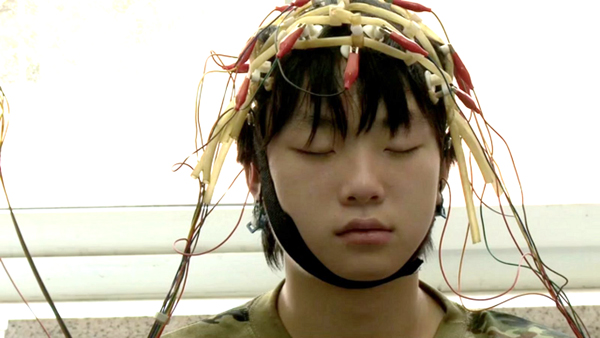On its own, the Internet can be a scary place. Compounded with addiction, there’s no telling how deeply the rabbit hole might take us. The documentary Web Junkie poses pertinent questions that, to some degree, affects anyone within reach of a Wi-Fi signal, and will resonate with whoever has sat and stared into the harsh glow of a computer screen. (If you’re reading this review, you’re already culpable).
The film, directed by Shosh Shlam and Hilla Medalia (Dancing in Jaffa), situates itself within the quarters of the Chinese Teenagers Mental Growth Center, a facility on the outskirts of Beijing that treats adolescents that have been diagnosed with Internet addiction. Web Junkie follows young patients who have been recently admitted to the rehabilitation center—largely against their own will—and cautiously listens in on their stunted interactions with fellow patients, therapists, and the perplexed parents, who are at as much of a loss about this affliction as their children appear to be.
A socially crippling dependency that has officially been labeled a clinical disorder by the Chinese government (the first country in the world to do so), Internet usage has surged so highly among Chinese youth that many believe that spending hours with fingers glued to keyboards is “normal” behavior. The addicts, who confess to dedicating more than 10 hours per day playing online games like World of Warcraft, forgo showering, eating, and sleeping in order to keep their high scores up.
When asked about their personal records for consecutive gameplay, the teens engage in gleeful one-upmanship. One teen claims to have gone 15 days straight without having ever logged off, while others brush off his claim. Though these youths are fully aware of their all-consuming virtual habits, they seem to possess little understanding of why they are in rehab and an even slighter desire to adjust their Internet savvy lifestyles.
The treatment center, which plays host primarily to boys between the ages of 12 and 16, runs like a military barrack crossed with a low-security prison. (Betty Ford Clinic, this is not). And while the kids are obliged to keep their beds tidy, perform regimented physical activity, and partake in group therapy, their parents are also encouraged to participate in lectures and undergo counseling sessions, if only to glean a fundamental understanding of what compels their children to engage in such unceasing online obsessions.
Shlam and Medalia employ methods of minimalism to capture such compelling footage. The kids appear to be relatively at ease speaking with the filmmakers, offering casual explanations for their raging behavior and their disillusionment with the physical world. One teen asserts, “[the center] destroys our old beliefs and makes new ones for us. It’s like brainwashing.” Another, Hacker (one of the film’s three protagonists), is asked why he can only share his secrets with his online friends: “Reality is too fake,” he insists. And thus, we discover where, according to the facilitators and filmmakers, the fundamental problem lies.
“These children have a bias towards the virtual reality,” insists Professor Tao, one of the head therapists and lecturers at the camp. “They think that the real world is not as good as the virtual world.” As the film delves into the icy relationships between some of the kids and their unreceptive parents, it’s not difficult to see why some of them might prefer the comfort and security of their online communities. At least in World of Warcraft, if you’re going to get stabbed, the damage will only affect simulated pixels. No real blood is drawn, unlike for the sons of fathers who threaten them with knives in an effort to scare them straight. I’d choose the virtual sword any day.
Web Junkie also briefly peers into romantic relationships formed through online gaming forums. Is it possible for legitimate love to blossom through the nontraditional barriers of slow modems and firewalls? Even the kids seem wary of such a proposition. “It’s very easy to say, ‘I love you,’ 1000 times online: Ctrl C and Ctrl V.” That may be true, but for some of these teens, virtual love may be the only form of affection that they know how to receive.
Is Internet addiction truly a global phenomenon, or is the culture of China an exceptional factor? Chinese youths may be more susceptible to the disorder simply because, to put it bluntly, they’re lonely. (The one-child population control policy has been in affect more or less since 1979.) And in regards to romantic relationships, these boys are often seeking online love because China’s gender imbalance has left them with few viable, real-world options.
Web Junkie might bypass hard facts and talking heads in favor of a fly-on-the-wall exposé, but it frequently raises contemplative questions and presents raw, revealing exchanges between the youths and their confounded elders.

















Leave A Comment